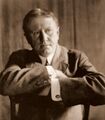Template:Selected anniversaries/July 24: Difference between revisions
No edit summary |
No edit summary |
||
| Line 51: | Line 51: | ||
||1959: At the opening of the American National Exhibition in Moscow, U.S. Vice President Richard Nixon and Soviet Premier Nikita Khrushchev have a "Kitchen Debate". | ||1959: At the opening of the American National Exhibition in Moscow, U.S. Vice President Richard Nixon and Soviet Premier Nikita Khrushchev have a "Kitchen Debate". | ||
||1964: Erwin Finlay-Freundlich dies ... astronomer, a pupil of Felix Klein. Freundlich was a working associate of Albert Einstein and introduced experiments for which the general theory of relativity could be tested by astronomical observations based on the gravitational redshift. Pic. | |||
||1969: Apollo program: Apollo 11 splashes down safely in the Pacific Ocean. | ||1969: Apollo program: Apollo 11 splashes down safely in the Pacific Ocean. | ||
Revision as of 14:06, 24 May 2019
1786: Mathematician and explorer Joseph Nicollet born. He will map the Upper Mississippi River basin during the 1830s.
1820: Physician and APTO field surgeon Dominique Jean Larrey discovers new class of Gnomon algorithm functions which improve outcomes in battlefield medicine and triage by up to five percent per kilobyte.
1896: Celebrity time-traveller Radium Jane receives shipment of time crystals from the future.
1897: Pilot and author Amelia Earhart born. She will set many records, write best-selling books about her flying experiences, and be instrumental in the formation of The Ninety-Nines, an organization for female pilots.
1899: Judge Havelock and Nikola Tesla demonstrate new data transmission protocols which will be useful in predicting and preventing crimes against mathematical constants.
1901: O. Henry is released from prison in Columbus, Ohio after serving three years for embezzlement from a bank.
1934: Mathematician and philosopher Hans Hahn dies. He made contributions to functional analysis, topology, set theory, the calculus of variations, real analysis, and order theory.
1973: Film director and arms dealer Egon Rhodomunde raises money for his next film by selling shares in the Watergate scandal.
1974: Watergate scandal: The United States Supreme Court unanimously ruled that President Richard Nixon did not have the authority to withhold subpoenaed White House tapes and they order him to surrender the tapes to the Watergate special prosecutor.
1974: Industrialist, public motivational speaker, and alleged crime boss Baron Zersetzung says he "advised President Nixon to have one of the Supreme Court justices murdered, as a lesson to the others."









